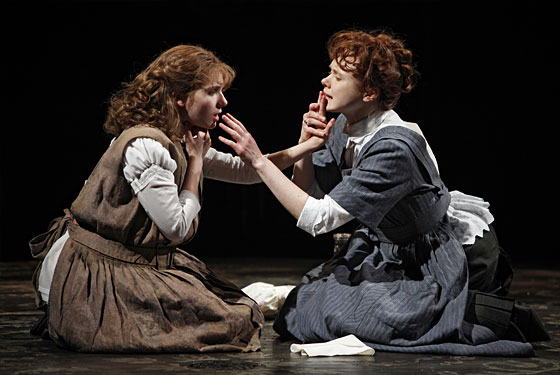
“This is hardly a war!” protests the genteel Captain Keller (Matthew Modine), in objection to the extreme teaching techniques—confinement, withholding of food, physical confrontation—proposed by his deaf, blind, and violent daughter’s brusque new tutor. “Well,” deadpans Annie Sullivan (Alison Pill), “it’s not love. A siege is a siege.” That it is. Though “siege” might be too dainty a word for what’s going on at Circle in the Square. It suggests a starchy standoff with lots of iron-willed pose striking and hoop-skirted costume-drama hokum. There are certainly whiffs of naphthalene here—unavoidable, perhaps, given The Miracle Worker’s provenance as a fifties TV movie. But Kate Whoriskey’s interpretation (the play’s first Broadway revival since Patty Duke and Anne Bancroft locked horns in 1959) ultimately comes down to nothing less than hand-to-hand combat between two indomitable wills—embodied here by two fiercely talented actresses—as great civilizational totems (teacher and student, superego and id, language and barbaric yawp) slug it out for ownership of the American soul.
The besieged, as any eighth-grade drama student knows, is Helen Keller (the demonically brilliant Abigail Breslin), Western civilization’s black box of hermetically sealed consciousness. Hooting, moaning, slapping, stamping, Breslin’s Helen seems to grow larger and more formidable as the play goes on. She’s more than a caged mind, awaiting forced liberation: She’s a hungry, ruddy incarnation of what Philip Roth called the Indigenous American Berserk. No po-faced moppet-zombie, she emanates, from those sightless eyes, an uncompromising life force, ungoverned and possibly ungovernable—the energies of a thousand tea parties concentrated in one angry child.
As her Yankee wrangler, Alison Pill, who has maybe ten pounds on Breslin, more than holds her own. (The two actresses’ superficial physical similarities—their matching statures and abutting pug noses—make a complex mentor-protégée relationship feel even more complex.) Taking a punch requires at least as much grit as delivering one, and Pill’s Sullivan absorbs more than her fair share of tooth-rattlers, body blows, and rabbit kicks. (Lee Sher’s superb fight choreography—I hesitate to call it choreography, as wonderfully, credibly, smotheringly ugly as it is—is a refreshing vérité break from Broadway’s usual slipshod fights.) This is, after all, an exorcism we’re witnessing, and Pill, with her take-a-swing-at-me sass, is up for it. Captain Keller, however, is not. Somewhere between his southern defiance and his southern defeatism, he’s already lost his daughter—and, by jingo, no uncouth female from Godless Boston is gonna come down here, et cetera et cetera tarnation et cetera. The captain—and the rest of the supporting characters—are pasteboard cutouts, and there’s only one way to play them: straight up. Modine does so manfully, not quite overcoming the Foghorn Leghorn–ness but letting the proud man’s pain bleed through his pride. (There’s no literal armpit sweat onstage, but Modine probably comes closest to evoking it.) His scenes with Pill bring into focus the playwright William Gibson’s strengths as a scenarist with a great ear for snappy dialogue. (Über-literal flashbacks to Annie’s charnel-house early years in a Boston insane asylum, however, point up Gibson’s hackier side.)
Ultimately, this Miracle finds its feet in the physical realm, in the clinch, at point-blank range—a proximity Whoriskey knows well, from her work in the war zone of Ruined. She and her cast restore immediacy to an old mimeograph of a fifties social drama, and that’s no small thing. Even more impressive, they make a compelling case for this material, however intermittently creaky, as deserving of immediacy. They remind us that Helen Keller was and is the ultimate “control” for the modern experiment—our continuing inquiry into the primacy of reason and the sanctity of the individual human mind—and that Sullivan remains the sainted foremother of all thick-skinned, steel-spined, tough-love rationalists. (A type we’ve had a lack of, lately, in American life and discourse.) The more raw and ungainly and futile the rasslin’ gets, the higher Breslin and Pill raise the stakes. “The purpose of war,” a Confederate governor once said, “is to explore each other.” Unsure what that means? So was I, until I saw The Miracle Worker.